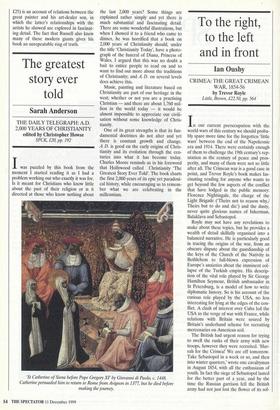To the right, to the left and in front
Ian Ousby
CRIMEA: THE GREAT CRIMEAN WAR, 1854-56 by Trevor Royle Little, Brown, £22.50, pp. 564
In our current preoccupation with the world wars of this century we should proba- bly spare more time for the forgotten 'little wars' between the end of the Napoleonic era and 1914. There were certainly enough of them to challenge the 19th century's rep- utation as the century of peace and pros- perity, and many of them were not so little after all. The Crimean war is a good case in point, and Trevor Royle's book makes fas- cinating reading for anyone who wants to get beyond the few aspects of the conflict that have lodged in the public memory: Florence Nightingale, the charge of the Light Brigade ('Theirs not to reason why,/ Theirs but to do and die') and the dusty, never quite glorious names of Inkerman, Balaklava and Sebastopol.
Royle may not have any revelations to make about these topics, but he provides a wealth of detail skilfully organised into a balanced narrative. He is particularly good in tracing the origins of the war, from an obscure dispute about the guardianship of the keys of the Church of the Nativity in Bethlehem to full-blown expression of Europe's anxieties about the imminent col- lapse of the Turkish empire. His descrip- tion of the vital role played by Sir George Hamilton Seymour, British ambassador in St Petersburg, is a model of how to write diplomatic history. So is his account of the curious role played by the USA, no less interesting for lying at the edges of the con- flict. A clash of interest over Cuba led the USA to the verge of war with France, while relations with Britain were soured by Britain's underhand scheme for recruiting mercenaries on American soil.
The British had urgent reason for trying to swell the ranks of their army with new troops, however they were recruited. 'Hur- rah for the Crimea! We are off tomorrow. Take Sebastopol in a week or so, and then into winter quarters,' wrote one cavalryman in August 1854, with all the enthusiasm of youth. In fact the siege of Sebastopol lasted for the better part of a year, and by the time the Russian garrison fell the British army had not just lost the flower of its sol- diers, its reputation lay in tatters too. Like the Russian cannon that destroyed the Light Brigade, the problems lay to the right, to the left and in front. Relations with the French — a traditional enemy, now fighting alongside the British in the first of three European wars — inevitably proved difficult. (Indeed, the Russians would have been justified in echoing Napoleon's prayer: 'Give me coalitions of allies to fight against.') The Army Commis- sariat would probably not have been up to the job of provisioning the short war it had bargained for; its performance during the long, hard winter of 1854-55 subjected the men in the field to intolerable hardship that, thanks to the vivid reporting of William Howard Russell, shocked readers of the Times into protest.
Even without these difficulties, the army had weaknesses enough of its own. It had lived too long on the reputation of Water- loo, nourishing itself with easy victories on colonial battlefields where numbers and firepower did the trick. For a modern European war it lacked experience and, glaringly, effective command. Royle is probably wise not to dwell too much on Lords Cardigan and Lucan — they are already notorious — but he is rather too kind in his judgment of their commander- in-chief Lord Raglan. Brave and amiable old gentleman he may have been, but he was unassertive in dealing with his allies or his political masters and on the battlefield he was almost devoid of ideas. The latter failing was, sadly, endemic among senior officers. 'Brains! I don't believe in brains,' said Victoria's cousin, the Duke of Cam- bridge, after successfully lobbying at the Palace to command the 1st Division in the Crimea.
There was a lesson to be learned from that remark (and from Cambridge's subse- quent promotion to field-marshal), just as there was a lesson to be learned from the long months of near-stalemate, the muddy trenches, the atrocities at Kertch and the crippling firepower. Crimea was no Victori- an genre painting — though of course the genre painters got busily to work with the most glowing colours in their palettes but a foretaste of what the British army would again encounter, and be surprised to encounter, in Flanders. Royle looks for- ward to these events in a couple of con- cluding chapters that lack his customary clarity of focus. But this is only a small blemish in a book which has already shown so effectively why the forgotten little wars of the 19th century deserve to be remem- bered.



























































































 Previous page
Previous page